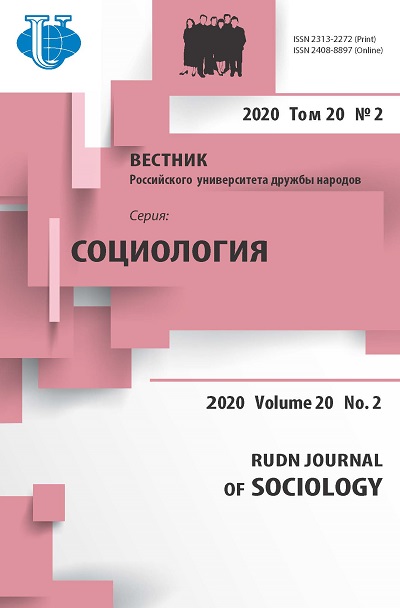On the way to eliminating theoretical difficulties of sociology of morality
- Authors: Sanzhenakov A.A.1
-
Affiliations:
- Institute of Philosophy and Law of the Siberian Branch of the Russian Academy of Sciences
- Issue: Vol 20, No 2 (2020)
- Pages: 252-262
- Section: Theory, Methodology and History of Sociological Research
- URL: https://journals.rudn.ru/sociology/article/view/23868
- DOI: https://doi.org/10.22363/2313-2272-2020-20-2-252-262
Cite item
Full Text
Abstract
The article aims at presenting theoretical difficulties of sociology of morality and possible ways to overcome them. The importance of this issue is determined by the necessity of the scientific study of moral elements of the contemporary society in order to prevent its dehumanization. Sociology of morality focuses on the empirical study of various moral phenomena (justice, duty, conscience) in the social space. At the first stage of such a study, sociologists conduct observations and collect data, and at the second stage, they generalize moral facts to identify moral patterns. In sociology, morality is considered as an element of society; therefore, it is not analyzed by itself but within a system of social relations. One of the difficulties of such studies is the ambivalent nature of morality, i.e. its existence in both public and individual consciousness: if sociologists ignore the individual mode of morality, they misrepresent the content of moral facts. Another reason for theoretical difficulties in the study of morality is that sociologists use outdated ideas about the nature of moral truths and researcher’s impartiality - moral judgments are considered as not being true or false, and the researcher should ignore his value attitudes when collecting and analyzing data. The elimination of these difficulties can lead to the loss of the sociological research specifics and to the merger of sociology and moral philosophy. Representatives of the ‘new sociology of morality’ have to reform this field but ensure its status of an independent scientific discipline. One of the ways to solve this task is to use ideas of analytic philosophy, in particular, of moral realism that defines moral qualities as qualities of real things, and moral truths as having the same status as scientific truths.
Keywords
About the authors
A. A. Sanzhenakov
Institute of Philosophy and Law of the Siberian Branch of the Russian Academy of Sciences
Author for correspondence.
Email: sanzhenakov@gmail.com
кандидат философских наук, старший научный сотрудник Института философии и права
Nikolaeva St., 8, Novosibirsk, 630090, RussiaReferences
- Apresyan R.G. Ponyatie obshchestvennoi morali [The concept of public morality]. Voprosy Filosopfii. 2006; 5 (In Russ.).
- Artemieva O.V. Sotsialnaya perspektiva etiki dobrodeteli [Social perspective of ethics of virtue]. Obshchestvennaya Moral. Moscow; 2009 (In Russ.).
- Batygin G.S. Kak nevozmozhna sotsiologiya morali [How sociology of morality is impossible]. Opravdanie morali. Sb. st. k 70-letiyu Yu.V. Sogomonova. Moscow–Tyumen; 2000 (In Russ.).
- Belyaeva E.V. Sotsiologiya morali i etika: transdistsiplinarny podkhod k issledovaniyu sovremennoi nravstvennosti [Sociology of morality and ethics: A transdisciplinary approach to the study of contemporary morality]. Sotsiologiya. 2015; 2 (In Russ.).
- Berdaus S.V. Mesto rannei etiki v fenomenologicheskom proekte E. Husserlya [The place of early ethics in the phenomenological project of Edmund Husserl]. Vestnik TGU. 2019; 442 (In Russ.).
- Blokhina N.A. Analiticheskaya filosofiya v poiskakh samoopredeleniya [Analytic philosophy in the search of self-determination]. Filosofskii Zhurnal. 2019; 1 (In Russ.).
- Vasiliev V.V. Chto takoe analiticheskaya filosofiya i pochemu vazhen etot vopros? [What is analytic philosophy, and why is this question important?]. Filosofsky Zhurnal. 2019; 1 (In Russ.).
- Wittgenstein L. Logiko-filosofsky traktat [Tractatus Logico-Philosophicus]. Filosofskie raboty. Moscow; 1994 (In Russ.).
- Kirilina T.Yu. Zarubezhnye uchenye o sotsiologii morali [Foreign scientists on sociology of morality]. Sotsiologicheskie Issledovaniya. 2009; 7 (In Russ.).
- Kirilina T.Yu. Teoretiko-metodologicheskie osnovy empiricheskogo issledovaniya morali [Theoretical-methodological foundations of the empirical study of morality]. Vestnik VGGU. Filosofiya, Sotsiologiya i Kulturologiya. 2009: 1 (In Russ.).
- Konovalova L.V. Rasteryannoe obshchestvo [Confused Society]. Moscow; 1986 (In Russ.).
- Lavrukhin A. Prakticheskaya filosofiya Edmunda Husserlya: proekt nauchnoi etiki [Practical philosophy of Edmund Husserl: A project of scientific ethics]. Vestnik RGGU. Seriya: Filosofiya. Sotsiologiya. 2007; 2–3 (In Russ.).
- Loux M.J. Metafizika v analiticheskoi traditsii [Metaphysics in the analytic tradition]. Filosofskii zhurnal. 2015; 2 (In Russ.).
- Maksimov L.V. Analiticheskaya etika [Analytic ethics]. Novaya filosofskaya entsiklopediya. Moscow; 2010. Vol. 1 (In Russ.).
- Maksimov L.V. Ob analiticheskom stile v etike [On the analytic style in ethics]. Eticheskaya Mysl. 2018; 1 (In Russ.).
- Meerovsky B.V. Adam Smith kak filosof-moralist [Adam Smith as a philosopher of morality]. Smith A. Teoriya nravstvennykh chuvstv. Moscow; 1997 (In Russ.).
- Moore G. Priroda moralnoi filosofii [Nature of Moral Philosophy]. Moscow; 1999 (In Russ.).
- Nazarov V.N. Prikladnaya etika [Applied Ethics]. Moscow; 2005 (In Russ.).
- Olkhovikov K.M. Sotsiologiya morali: voprosy teorii i vybora strategii issledovaniya [Sociology of morality: Issues of theory and choosing the research strategy]. Yekaterinburg; 2003 (In Russ.).
- Sokolov V.M. Sotsiologiya nravstvennogo razvitiya lichnosti [Sociology of the moral development of personality]. Moscow; 1986 (In Russ.).
- Figura A.O. Ontologicheskie osnovaniya sotsialnoi realnosti v kontseptsii R. Bkhaskara [Ontological foundations of social reality in the theory of R. Bhaskar]. Vestnik Omskogo universiteta. 2012; 1 (In Russ.).
- Tselishchev V.V. Analiticheskaya filosofiya i revizionizm bez beregov [Analytic philosophy and revisionism without borders]. Filosofsky Zhurnal. 2018; 2 (In Russ.).
- Abend G. Thick concepts and sociological research. Sociological Theory. 2019; 3.
- Abend G. Two main problems in the sociology of morality. Theory and Society. 2008; 2.
- Bhaskar R. A Realistic Theory of Science. Leeds; 1975.
- Hitlin S., Vaisey S. The new sociology of morality. Annual Review of Sociology. 2013; 39.
- Tännsjö T. Truth in ethics, truth in science — different? Asian Hospital & Healthcare Management. 2007; 14.
- MacIntyre A. After Virtue: A Study in Moral Theory. Notre Dame; 1984.
- Shafer-Landau R. Moral Realism: A Defence. Oxford; 2003.
- Swinburne R. God and morality. Think. 2008; 20.














